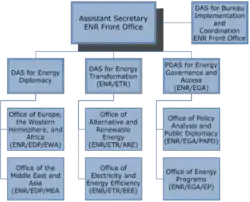Bureau of Energy Resources
The Bureau of Energy Resources (ENR) is a bureau in the United States Department of State that coordinates the department's efforts in promoting international energy security.[2][3] Under the purview of the Under Secretary of State for Economic Growth, Energy, and the Environment.[4] the Bureau of Energy Resources' current head is Assistant Secretary Geoffrey R. Pyatt.
 Seal of the United States Department of State | |
| Bureau overview | |
|---|---|
| Formed | November 16, 2011 |
| Jurisdiction | Executive branch of the United States |
| Employees | 91 (as of 2016)[1] |
| Annual budget | $16.35 million (FY 2015)[1] |
| Bureau executive | |
| Parent department | U.S. Department of State |
| Website | Official website |
History
The Bureau of Energy Resources was established in October 2011, following a recommendation in the 2010 Quadrennial Diplomacy and Development Review calling on the department to create a bureau uniting diplomatic and programmatic efforts in the global production and use of energy.[1][5][6] The new bureau combined personnel and assets previously assigned to existing energy-related offices in the department, primarily from what is now the Bureau of Economic and Business Affairs.[1]
Organization

The bureau is headed by the Special Envoy and Coordinator for International Energy Affairs, who is appointed by the United States Secretary of State.[1] Four Deputy Assistant Secretaries also oversee different divisions of the bureau, namely Energy Diplomacy, Energy Transformation, Energy Governance and Access, and Bureau Implementation and Coordination.[7] Six unique offices exist within the bureau:
- Office of Europe, the Western Hemisphere, and Africa
- Office of the Middle East and Asia
- Office of Alternative and Renewable Energy
- Office of Electricity and Energy Efficiency
- Office of Policy Analysis and Public Diplomacy
- Office of Energy Programs
The bureau manages three foreign assistance programs with a total FY 2014 budget of $11.8 million in economic support funds. ENR relies heavily on interagency agreements with the Departments of Interior, Commerce, and Treasury, as well as on contracted private-sector firms, to implement technical assistance.[1]
See also
References
- "Inspection of the Bureau of Energy Resources" (PDF). Inspector General of the Department of State. February 2016. Retrieved March 24, 2016.
- Johnson, Keith (November 16, 2011). "U.S. Brings Diplomacy to Politics Of Energy". The Wall Street Journal. Retrieved March 24, 2016.
- Goldberg, Suzanne (November 21, 2011). "Energy resource bureau aims to bring State Department out of the dark ages". The Guardian. Retrieved March 24, 2016.
- "Department Organization Chart". U.S. Department of State. March 2014. Retrieved March 24, 2016.
- "State Department Launches "Bureau of Energy Resources"". Spokesperson for the United States Department of State. November 16, 2011. Retrieved March 24, 2016.
- "The State Department's New Bureau of Energy Resources: Shaping America's Global Energy Policy". U.S. Department of State. November 16, 2011. Retrieved March 24, 2016.
- "Bureau of Energy Resources (ENR)". Foreign Affairs Manual. October 22, 2012. Retrieved April 4, 2016.